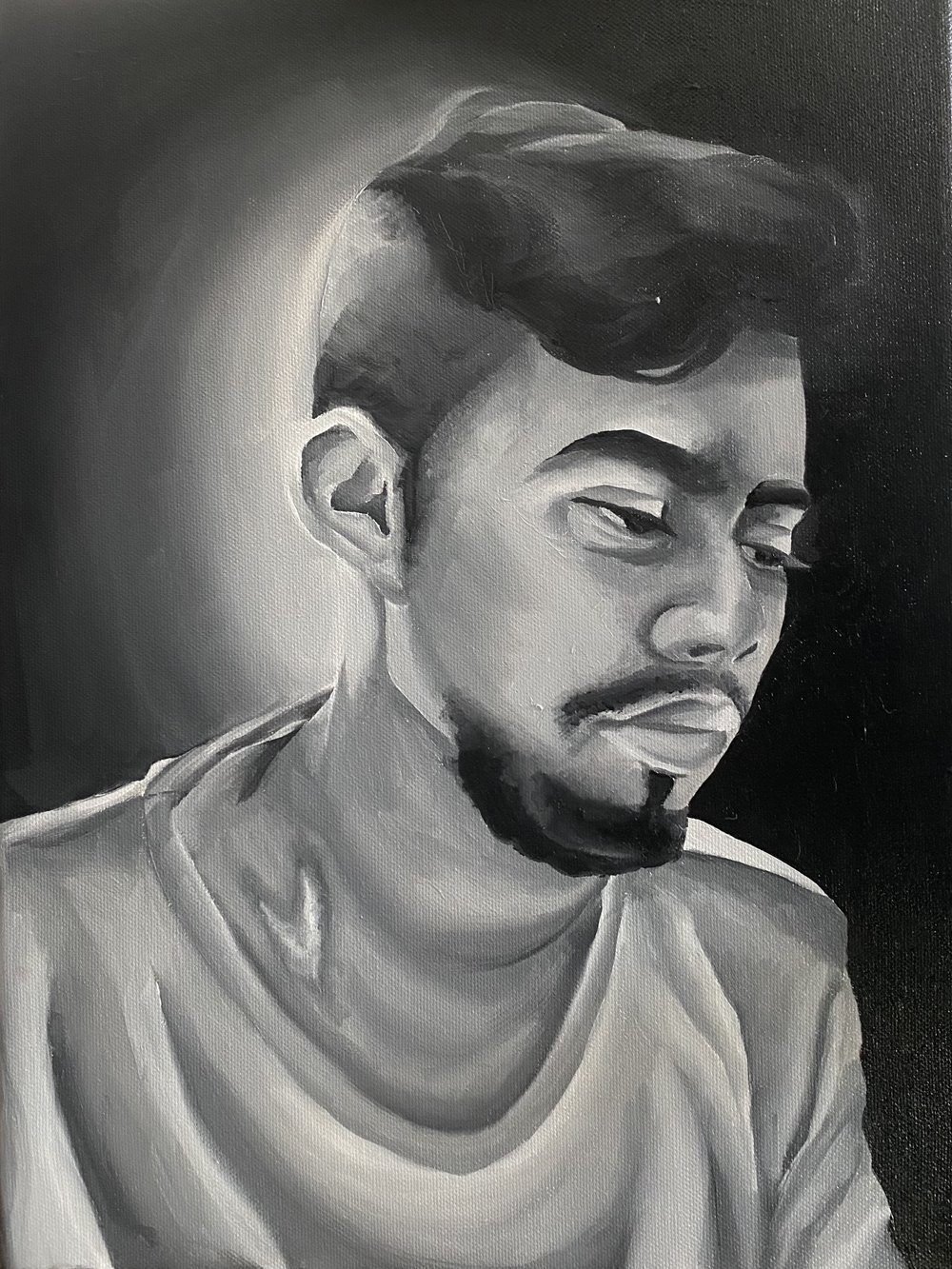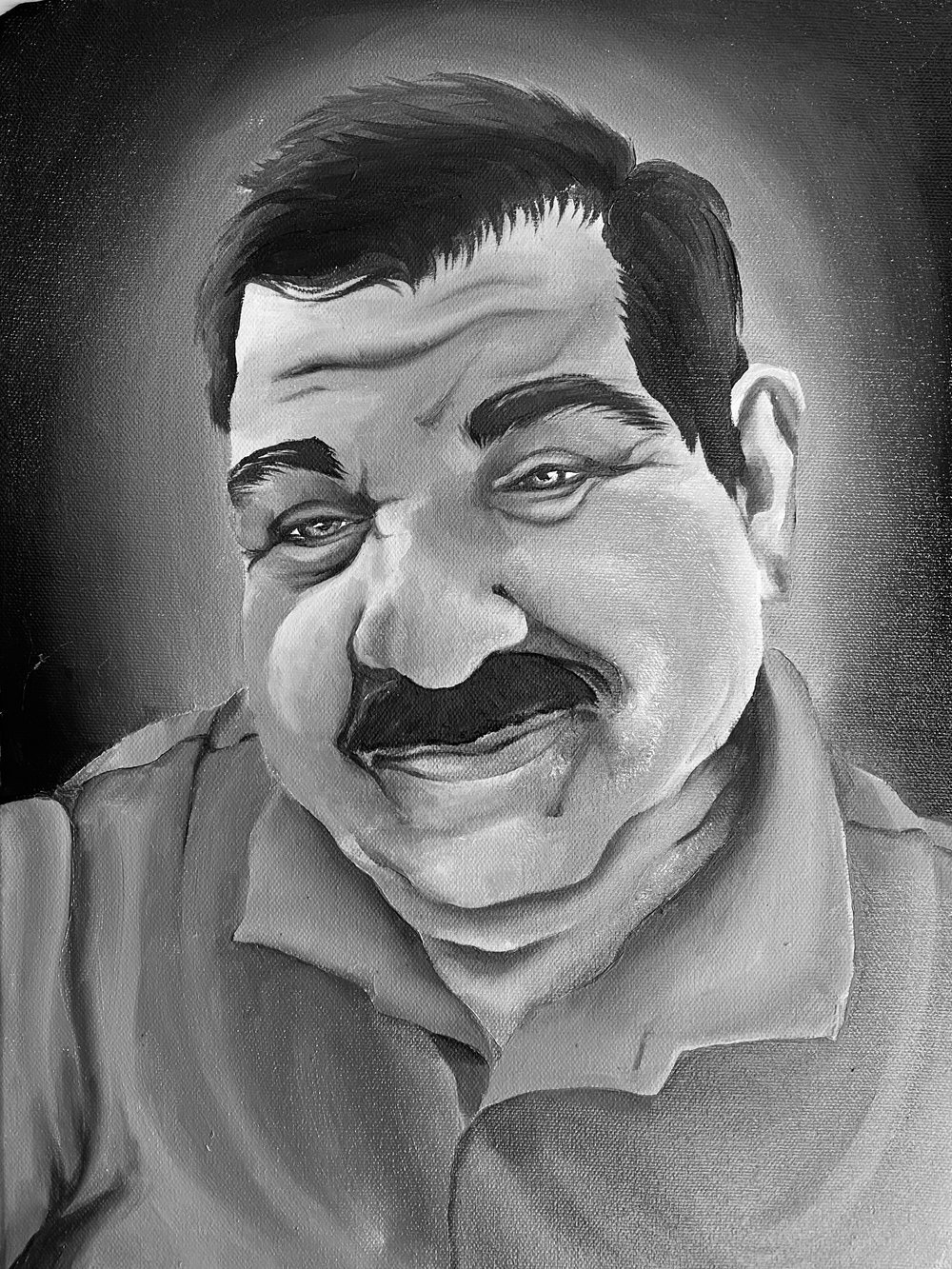IN BETWEEN
A PORTRAIT SERIES
In an effort to shed light on the realities of the migrant experience, I painted a series of portraits of refugees, titled In Between, accompanied by their firsthand accounts of their journeys to this country.
I worked with current and former residents at Casa Marianella, an Austin based refugee shelter that offers displaced immigrants shelter and support services.
Names have been withheld to minimize any legal or safety risk.
NICARAGUA
“There are no gangs in Nicaragua, but the government is a gang. We thought we could get rid of the government if we protested. I attended a political protest and was badly beaten by police officers. I still can’t use my arm - they tore my nerves when beating me. They threatened to kill me, so I had to leave.
On the journey here, I paid someone to bring me here but was abandoned along the way. I was kidnapped by cartel members and they held me for ransom for 3 days. My family had to pay them for me to be released.
I turned myself in at the border. They put me in a terrible place. I couldn’t eat the food at first, but I got used to it. It was so cold, and there were so many people with not enough place to sleep.
I heard about Casa Marianella through other people in detention and am grateful to be safe here. The greatest luck is feeling safe. It is hard to find work without being able to use my arm, but I have faith in God I will recover.”
EL SALVADOR
(translated from Spanish)
“In El Salvador, I worked as a housekeeper until I had a daughter of my own. She was born with a disability and did not walk until age 3. I tried to start a tortilleria but it was not enough to support us and pay for her medical care.
With $250 and the help of the Virgin Mary, I was able to make it to the United States. In detention, I quickly learned that food is a gift from God. The food they gave us was like something a dog vomited up. The federal agents would yell and push us. I had to wear an ankle monitor and was held in the ‘icebox,’ [a crowded holding room kept at frigid temperatures] given only a sheet of aluminum as a blanket. I spent 481 days in detention in California before I was able to come to Casa Marianella.
I worry so much for my daughter living among the gang violence in El Salvador. She was once kidnapped from school and assaulted by gang members. I send money back to her for medical expenses, but I very badly want my daughter to be able to be here with me. She is my rose petal.”
IRAQ
“I lived at Casa Marianella five years ago. I came from Baghdad, Iraq. I had a good life there. I was an actor; I spent 25 years in television and loved it. I had to leave my country because of the wars.
I was able to get a visa because my daughter lives here, but it is still an ongoing process. I took English classes at ACC, but there is still a language barrier at work. I work as a security guard. I am so grateful for the company I work for because they gave me a trailer to sleep in.
I enjoy Austin and would like to stay here. My wife is still back home, and I would like her to one day join me here. I would have liked to return to Iraq before the war, but I do not think I can anymore. I believe it is God’s plan that I am here.
I am happy to be here, Austin is my home.”
HONDURAS
“I left Honduras in 2018. The drug cartels tried to recruit me, and when I refused they threatened my life. I didn’t want their dirty money - my richness is my life.
The journey through Mexico was dangerous. I spent much of my journey on top of La Bestia, [the freight train running through Mexico.] We would often have to jump off and run for miles, because it was a frequent target of gang violence. Once I was captured and robbed of all of my money.
After arriving in America, I spent three years in detention centers. The worst one was the Etowah County Center in Alabama. I will never, ever go back to Alabama. The food was worse than dog food, and often there wasn’t enough. There was one microwave and one TV for 140 people. It was a prison. They don’t care if you live or die. My friend had Covid and wasn’t treated for days. At that point I wanted him to cough on me and give me Covid because it was too hard to fight to live. We weren’t even asking for freedom, we just wanted a better prison. My beard turned white. I’m 31 years old, my beard is not supposed to be white yet.
I am so happy to finally be free. I remember eating my first banana in three years - it was so sweet, so fresh.
I want people to know most of us immigrants are good people. I just want to learn the rules of America so that I can follow them. I am open to any kind of work, and I will do it with love.”
CONGO
(translated from Spanish)
“In Congo, I owned my own business and my husband was an electrician. We left due to the political instability - the government there is dangerous.
Our journey to America took a year. My husband, son and I traveled through many countries, mostly on foot. We witnessed a lot of suffering along the way. The worst stretch was the Darien Gap between Colombia and Panama. We walked for nine days with little food and water. It was not easy.
When we arrived at the border, we spent the night in detention. I remember my blood pressure being so high because I was so worried for our future.
Things have been good in America so far, but the language barrier is difficult. I work as a machine operator in a factory now, and I am not used to working for another person. I hope to one day start a business like Casa Marianella, to help people from my home country come to America.”
Feature in Casa Marianella’s Annual Newsletter
In addition to sharing these stories, I wanted to give back to Casa Marianella in a tangible way and launched a fundraiser, with all donations going directly to promote self sufficiency among Casa residents (shelter, food, clothing, legal services, language classes, etc.) With the help of my peers I was able to surpass my goal of raising $500 :) You can still donate at the link below:






